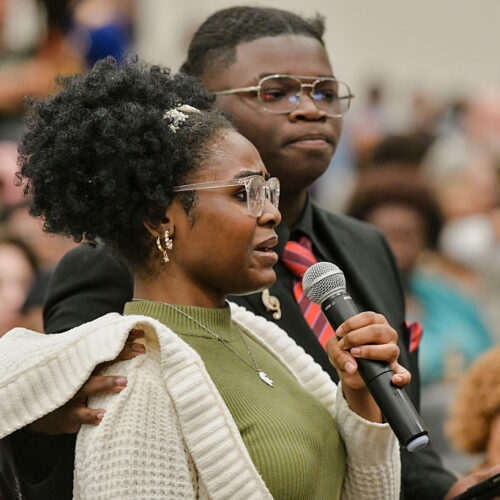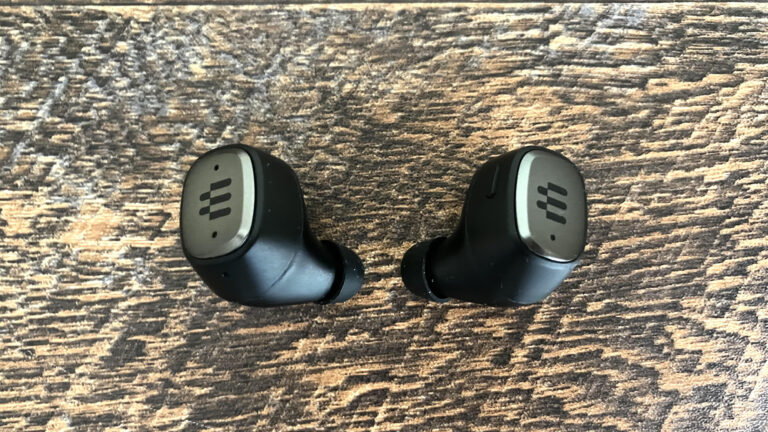Evidence suggests health department gave preferential treatment to xAI, NAACP says.
Local students speak in opposition to a proposal by Elon Musk’s xAI to run gas turbines at its data center during a public comment meeting hosted by the Shelby County Health Department at Fairley High School on xAI’s permit application to use gas turbines for a new data center in Memphis, TN on April 25, 2025. Credit: The Washington Post / Contributor | The Washington Post
xAI continues to face backlash over its Memphis data center, as the NAACP joined groups today appealing the issuance of a recently granted permit that the groups say will allow xAI to introduce major new sources of pollutants without warning at any time.
The battle over the gas turbines powering xAI’s data center began last April when thermal imaging seemed to show that the firm was lying about dozens of seemingly operational turbines that could be a major source of smog-causing pollution. By June, the NAACP got involved, notifying the Shelby County Health Department (SCHD) of its intent to sue xAI to force Elon Musk’s AI company to engage with community members in historically Black neighborhoods who are believed to be most affected by the pollution risks.
But the NAACP’s letter seemingly did nothing to stop the SCHD from granting the permits two weeks later on July 2, as well as exemptions that xAI does not appear to qualify for, the appeal noted. Now, the NAACP—alongside environmental justice groups; the Southern Environmental Law Center (SELC); and Young, Gifted and Green—is appealing. The groups are hoping the Memphis and Shelby County Air Pollution Control Board will revoke the permit and block the exemptions, agreeing that the SCHD’s decisions were fatally flawed, violating the Clean Air Act and local laws.
SCHD’s permit granted xAI permission to operate 15 gas turbines at the Memphis data center, while the SELC’s imaging showed that xAI was potentially operating as many as 24. Prior to the permitting, xAI was accused of operating at least 35 turbines without the best-available pollution controls.
In their appeal, the NAACP and other groups argued that the SCHD put xAI profits over Black people’s health, granting unlawful exemptions while turning a blind eye to xAI’s operations, which allegedly started in 2024 but were treated as brand new in 2025.
Significantly, the groups claimed that the health department “improperly ignored” the prior turbine activity and the additional turbines still believed to be on site, unlawfully deeming some of the turbines as “temporary” and designating xAI’s facility a new project with no prior emissions sources. Had xAI’s data center been categorized as a modification to an existing major source of pollutants, the appeal said, xAI would’ve faced stricter emissions controls and “robust ambient air quality impacts assessments.”
And perhaps more concerningly, the exemptions granted could allow xAI—or any other emerging major sources of pollutants in the area—to “install and operate any number of new polluting turbines at any time without any written approval from the Health Department, without any public notice or public participation, and without pollution controls,” the appeal said.
The SCHD and xAI did not respond to Ars’ request to comment.
Officials accused of cherry-picking Clean Air Act
The appeal called out the SCHD for “tellingly” omitting key provisions of the Clean Air Act that allegedly undermined the department’s “position” when explaining why xAI qualified for exemptions. Groups also suggested that xAI was getting preferential treatment, providing as evidence a side-by-side comparison of a permit with stricter emissions requirements granted to a natural gas power plant, issued within months of granting xAI’s permit with only generalized emissions requirements.
“The Department cannot cherry pick which parts of the federal Clean Air Act it believes are relevant,” the appeal said, calling the SCHD’s decisions a “blatant” misrepresentation of the federal law while pointing to statements from the Environmental Protection Agency (EPA) that allegedly “directly” contradict the health department’s position.
For some Memphians protesting xAI’s facility, it seems “indisputable” that xAI’s turbines fall outside of the Clean Air Act requirements, whether they’re temporary or permanent, and if that’s true, it is “undeniable” that the activity violates the law. They’re afraid the health department is prioritizing xAI’s corporate gains over their health by “failing to establish enforceable emission limits” on the data center, which powers what xAI hypes as the world’s largest AI supercomputer, Colossus, the engine behind its controversial Grok models.
Rather than a minor source, as the SCHD designated the facility, Memphians think the data center is already a major source of pollutants, with its permitted turbines releasing, at minimum, 900 tons of nitrogen oxides (NOx) per year. That’s more than three times the threshold that the Clean Air Act uses to define a major source: “one that ’emits, or has the potential to emit,’ at least 250 tons of NOx per year,” the appeal noted. Further, the allegedly overlooked additional turbines that were on site at xAI when permitting was granted “have the potential to emit at least 560 tons of NOx per year.”
But so far, Memphians appear stuck with the SCHD’s generalized emissions requirements and xAI’s voluntary emission limits, which the appeal alleged “fall short” of the stringent limits imposed if xAI were forced to use best-available control technologies. Fixing that is “especially critical given the ongoing and worsening smog problem in Memphis,” environmental groups alleged, which is an area that has “failed to meet EPA’s air quality standard for ozone for years.”
xAI also apparently conducted some “air dispersion modeling” to appease critics. But, again, that process was not comparable to the more rigorous analysis that would’ve been required to get what the EPA calls a Prevention of Significant Deterioration permit, the appeal said.
Groups want xAI’s permit revoked
To shield Memphians from ongoing health risks, the NAACP and environmental justice groups have urged the Memphis and Shelby County Air Pollution Control Board to act now.
Memphis is a city already grappling with high rates of emergency room visits and deaths from asthma, with cancer rates four times the national average. Residents have already begun wearing masks, avoiding the outdoors, and keeping their windows closed since xAI’s data center moved in, the appeal noted. Residents remain “deeply concerned” about feared exposure to alleged pollutants that can “cause a variety of adverse health effects,” including “increased risk of lung infection, aggravated respiratory diseases such as emphysema and chronic bronchitis, and increased frequency of asthma attack,” as well as certain types of cancer.
In an SELC press release, LaTricea Adams, CEO and President of Young, Gifted and Green, called the SCHD’s decisions on xAI’s permit “reckless.”
“As a Black woman born and raised in Memphis, I know firsthand how industry harms Black communities while those in power cower away from justice,” Adams said. “The Shelby County Health Department needs to do their job to protect the health of ALL Memphians, especially those in frontline communities… that are burdened with a history of environmental racism, legacy pollution, and redlining.”
Groups also suspect xAI is stockpiling dozens of gas turbines to potentially power a second facility nearby—which could lead to over 90 turbines in operation. To get that facility up and running, Musk claimed that he will be “copying and pasting” the process for launching the first data center, SELC’s press release said.
Groups appealing have asked the board to revoke xAI’s permits and declare that xAI’s turbines do not qualify for exemptions from the Clean Air Act or other laws and that all permits for gas turbines must meet strict EPA standards. If successful, groups could force xAI to redo the permitting process “pursuant to the major source requirements of the Clean Air Act” and local law. At the very least, they’ve asked the board to remand the permit to the health department to “reconsider its determinations.”
Unless the pollution control board intervenes, Memphians worry xAI’s “unlawful conduct risks being repeated and evading review,” with any turbines removed easily brought back with “no notice” to residents if xAI’s exemptions remain in place.
“Nothing is stopping xAI from installing additional unpermitted turbines at any time to meet its widely-publicized demand for additional power,” the appeal said.
NAACP’s director of environmental justice, Abre’ Conner, confirmed in the SELC’s press release that his group and community members “have repeatedly shared concerns that xAI is causing a significant increase in the pollution of the air Memphians breathe.”
“The health department should focus on people’s health—not on maximizing corporate gain,” Conner said.
Ashley is a senior policy reporter for Ars Technica, dedicated to tracking social impacts of emerging policies and new technologies. She is a Chicago-based journalist with 20 years of experience.




